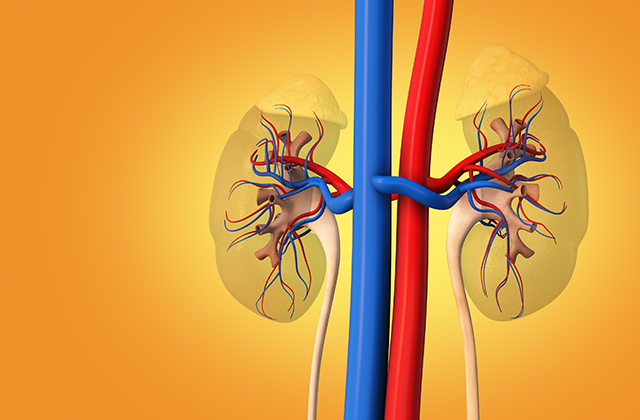
Outsize benefit seen in trial of drug for kidney disease
70% of patients who received the test drug paired with a standard-care drug experienced a significant drop in albuminuria.Media Contact: Brian Donohue - 206-543-7856, bdonohue@uw.edu

In a clinical trial of patients with chronic kidney disease, an experimental drug significantly reduced albuminuria — albumin in urine, a sign of kidney damage — for 50% of participants. When the experimental drug was paired with a standard-care medication, 70% of participants reportedly experienced a significant reduction in albuminuria.
The findings were published Dec. 15 in The Lancet. The paper’s lead author is Dr. Katherine Tuttle, a clinical professor of nephrology at the University of Washington School of Medicine and executive director for research at Providence Inland Northwest Health in Spokane.
The drug candidate, BI 690517, is designed to inhibit the body’s production of aldosterone, a hormone that balances sodium and potassium levels to help regulate blood pressure. Too much aldosterone, however, speeds kidney disease’s progression.
“We've known for several decades that aldosterone is a major driver of inflammation and fibrosis in the kidney and also in the heart. It has just been very hard to target therapeutically,” Tuttle said.

The challenge, she explained, is that two classes of standard-care therapies for kidney disease, angiotensin-converting enzyme (ACE) inhibitors and angiotensin receptor blockers (ARB), tend to increase aldosterone levels over the long term. Aldosterone inhibitors themselves, while reducing organ inflammation and preventing kidney disease’s progression to kidney failure, can allow blood potassium to reach dangerous levels, a state called hyperkalemia, among other unfavorable side effects.
These considerations shaped the trial’s design.
“Participants had to be on an ACE or an ARB at a maximally tolerated dose for at least four weeks before they could go into the study,” Tuttle said. “And we added another medication, an SGLT2 inhibitor called empagliflozin, as background therapy for participants.”
Although sodium-glucose cotransporter-2 (SGLT2) inhibitors were initially developed to lower blood sugar, they are powerful kidney-protective drugs. Tuttle called them “the biggest breakthroughs we’ve had for kidney disease in 30 years.” One of their secondary benefits, she noted, is to mitigate the risk of hyperkalemia.
“That gave us the opportunity to test BI 690517 for efficacy at increasing the protection of kidneys and also to reduce the major side effect that had limited the use of aldosterone-inhibiting agents,” Tuttle said. “Ensuring that an SGLT2 inhibitor was in the background for participants was an important design feature.”
The trial began in February 2022 and ended in July 2023. All 714 enrollees had formal diagnoses of kidney disease and were randomized to an initial eight-week therapy of empagliflozin or a matched placebo. Subsequently, 586 participants were randomly assigned to receive either BI 690517 at a daily dose of either 3 mg, 10 mg or 20 mg, or matched placebo, for 14 weeks.
The measure of efficacy was reduction in albuminuria. A clinically meaningful reduction in albuminuria levels (30% or more) occurred in half of participants randomized to receive BI 690517 alone. The response peak was seen with 10 mg doses. A substantially larger number of participants, 70%, who received both BI 609517 and empagliflozin achieved a clinically meaningful reduction in albuminuria.
In the study, BI 690517 also was associated with higher rates of hyperkalemia, compared with placebo, but most cases did not require medical intervention, the researchers wrote. In observing empagliflozin’s apparent ameliorating effects on hyperkalemia, they noted that “the magnitude of potassium reduction by empagliflozin is in line with recently reported meta-analyses including nearly 50,000 participants.”
The finding will inform a Phase 3 clinical trial, led by Oxford Population Health in England, to test the drug candidate with 11,000 patient-participants worldwide, Tuttle said.
“We think these are high-impact findings,” she said. “Seventy-five percent of all people on dialysis have diabetes or hypertensive kidney disease, and these agents — if we can get it right in terms of awareness and access and detection at a stage where it's treatable — might make dialysis almost obsolete. This is in reach.”
Tuttle and other of the study’s investigators have advised Boehringer Ingelheim, the manufacturer of BI 690517 and the study’s sponsor. The authors’ conflict-of-interest statements are in the published paper, which will be provided to journalists upon request.
For details about UW Medicine, please visit https://uwmedicine.org/about.